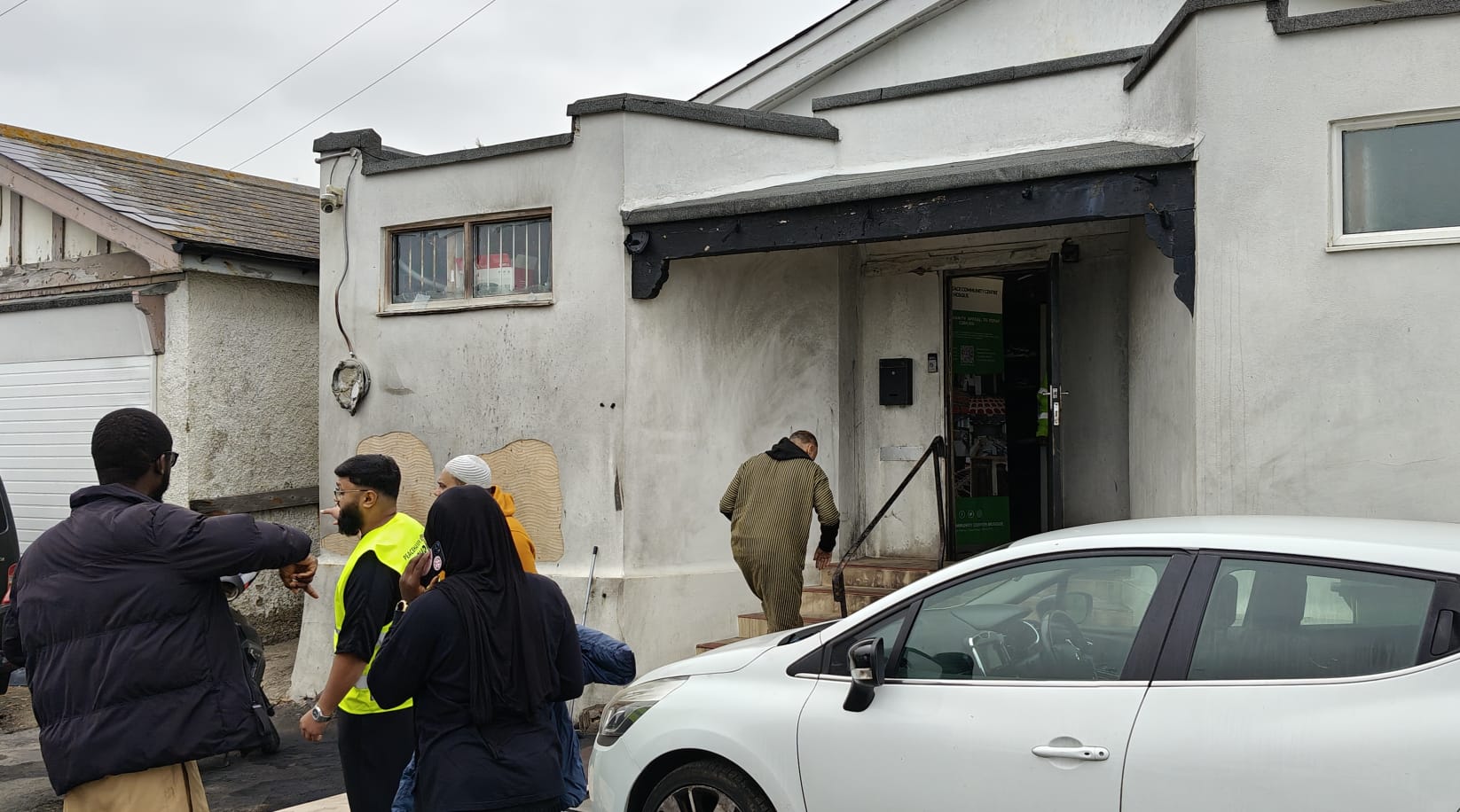
By Home Affairs Correspondent additional reporting Ahmed J Versi
Prime Minister Sir Keir Starmer has pledged an additional £10 million to strengthen security at mosques and Muslim faith centres, following a wave of violent attacks that have left Muslim communities across England “traumatised and fearful”.
The funding was announced during the PM’s visit to Peacehaven Mosque on October 23, which came 19 days after the firebombing on October 4. This delayed high-level visit followed widespread criticism from Muslim community leaders and national advocacy groups, who had expressed dismay over what they described as a lack of immediate response and empathy from the government.
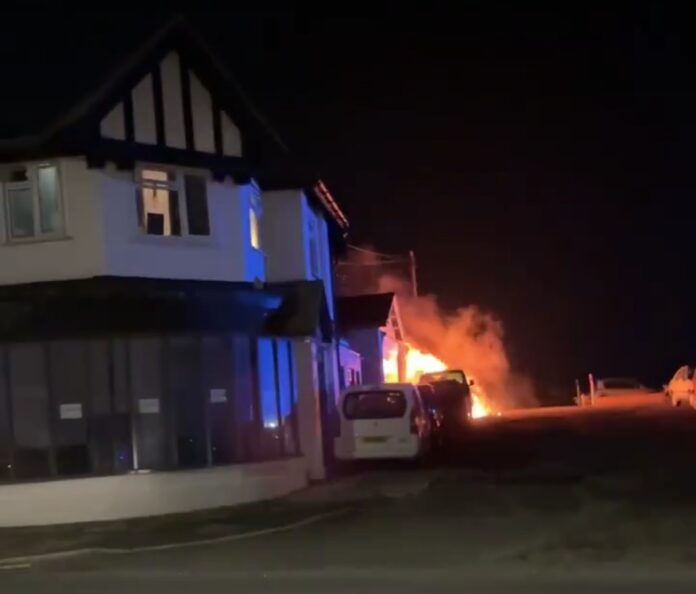
Photo: Screenshot captures the firebombing of Peacehaven Mosque on October 4 (Credit: X)
The Muslim Council of Britain welcomed the funding but immediately underscored its limitations. Dr Naomi Green, Assistant Secretary General of the MCB, stated, “The boost to the Protective Security for Mosques Scheme is long overdue and welcome following today’s visit to Peacehaven Mosque. However, the Government also still appears to have its head in the sand about what is driving this onslaught of hostility and Islamophobic attacks towards British Muslims. For as long as we are treating the symptoms, and not the causes, minoritised faith communities will continue to live in the shadow of such hate.”
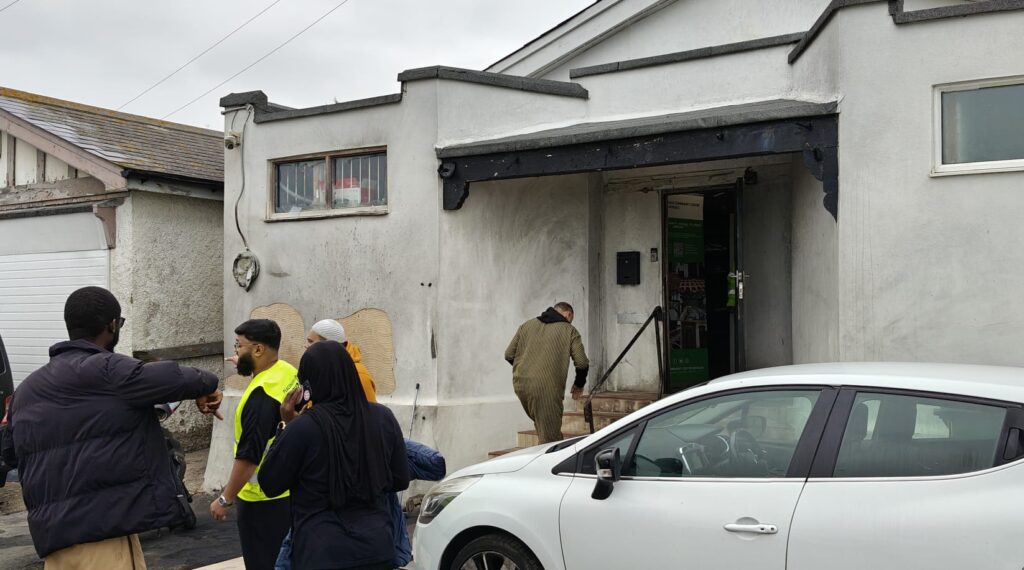
Photos: The aftermath of the firebombing of Peacehaven Mosque on October 4, located on Phyllis Avenue in Peacehaven, East Sussex. (Photos courtesy Peacehaven Mosque)
The government’s initial response was to send the junior Minister for Policing, Sarah Jones, to the mosque on October 6—two days after the attack. There had been no prior contact from the Prime Minister’s office before this. According to Syed Mahmood Tariq Jung of Brighton & Hove Muslim Forum, who was present at the meeting with the minister, she spent several hours at the mosque listening to community concerns, which included complaints about a previous, unreported attempt to attack the mosque and a history of similar incidents at other mosques in the Brighton area.
During that meeting, community leaders and worshippers directly challenged the official classification of the crime. “This should be recognised as a terrorist attack,” Muslim Forum said in a statement. One worshipper told the minister, “I am terror, I was terrorized.” However, Jung stated that the minister, while taking notes, did not commit to reclassifying the incident. “They did not openly say that we are now going to upgrade it to a terrorist attack. Really, I find astonishing,” Jung told The Muslim News.
This initial response was seen by local worshippers and community figures as an insufficient gesture at a time they were calling for top-level solidarity. However, according to another trustee, Muhammad Saqib Khan, the local MP, Chris Ward, visited the mosque the next day. “He came to see us two to three times and helped liaison with the police.”
The government’s response continued to draw scrutiny during the PM’s visit, as observers noted that neither he nor Home Secretary, Shabana Mahmood, used the term “Islamophobia” in their public remarks. This linguistic avoidance was highlighted by community representatives, who contrasted it with the government’s swift use of the term “antisemitism” in condemnations of attacks on synagogues. For many community leaders, this reinforced perceptions of a double standard in acknowledging and naming anti-Muslim hatred.
The October 4 attack on Peacehaven Mosque in East Sussex triggered national outrage after two masked men poured accelerant over the mosque’s entrance and set it alight while a worshippers, including the Imam were still inside. “The attackers attempted to break into the mosque to set it on fire, and when they failed to gain entry, they poured petrol at the front entrance and set it alight, said the Forum. The front doors and a nearby car were engulfed in flames before firefighters extinguished the blaze.
“We thank God no lives were lost and extend our deep gratitude to the emergency services for their swift response,” added the statement.
“This was a deliberate act of terror and killing, not vandalism, aimed at spreading fear and division. It comes amid a worrying rise in Islamophobia and antisemitism across the UK, fuelled by far-right extremism and divisive rhetoric,” said the Forum.
Four suspects were later arrested for arson with intent to endanger life, but Sussex Police have so far treated the case as a hate crime — a decision that has angered Muslim communities, who say the attack should be recognised as an act of terrorism.
Jung said the attack has left worshippers terrified. “The women especially said they now feel frightened to leave home or bring their children to madrasa… Some elders have stopped coming to the mosque altogether,” he said. He described a community living in shock, with children now afraid to attend religious education after seeing the fire damage.
The Suffah Institute, a local community organisation, accused authorities of applying a double standard in their treatment of anti-Muslim attacks. “To label the horrific ramming and stabbing in Manchester as terrorism — and not a hate crime — and to classify an arson attack on a mosque, which aims to spread fear and terror in the very same way, as merely a ‘hate crime’ is to apply a dangerous double standard,” the group said in a statement.
Joined by Mahmood, the Prime Minister met survivors and community members and announced the new £10m security fund for Muslim institutions, including CCTV, alarm systems, secure fencing, and security staff.
“We shouldn’t need to have security in places of worship, and it’s sad that we do,” he told those gathered, according to official Downing Street report. “Attacks on any community are attacks on our entire nation and our values.”
Starmer added that Britain remained a “proud and tolerant country” and that the new funding would help ensure Muslims could “live in peace and safety.”
However, many mosques have not been able to get funds promised by the government in the past.
Relatives of a worshipper who fled from inside the mosque when it was torched told the Prime Minister the man had become withdrawn and traumatised. “He’s very traumatised,” a family member said, “as the mosque was his life.”
A national wave of Islamophobic violence
The Peacehaven arson was part of a disturbing pattern of anti-Muslim incidents across England and Wales in recent months.
September 22 – Hounslow, West London: Imam Sheikh Mohamed Yusuf of the Al Furqan Education Trust was stabbed outside his centre in what worshippers described as an unprovoked attack. The Metropolitan Police said the motive remained under investigation and that no arrests had yet been made.
Statement from Al Furqan Education Trust in Hounslow, West London. pic.twitter.com/Mu673bSbFV
— Taj Ali (@Taj_Ali1) September 24, 2025
October 4 – Watford, Hertfordshire: Three Islamic institutions — the Imam Hussein Foundation Centre, North Watford Jamia Mosque, and St Thomas Church (a site due for conversion into a mosque) — were defaced with painted crosses in what police called “religiously aggravated attacks.”
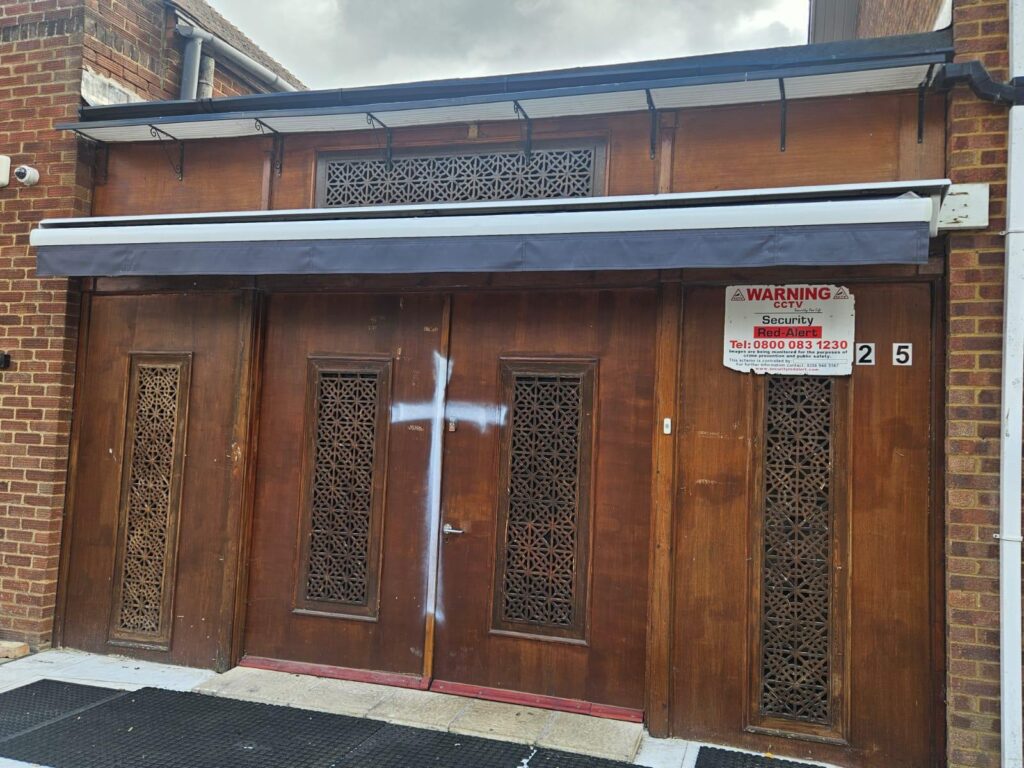
Photo: one of three cross vandalisms on October 4, at Watford Jamia Mosque, where crosses were painted on the building in what police described as “religiously aggravated attacks.” (Photos courtesy of Watford Jamia Mosque)
October 14 – Epsom, Surrey: The Epsom Islamic Centre was targeted with hate graffiti in the early hours. Police opened an inquiry into “racially or religiously aggravated criminal damage”. It was the second attack on the centre in recent months.
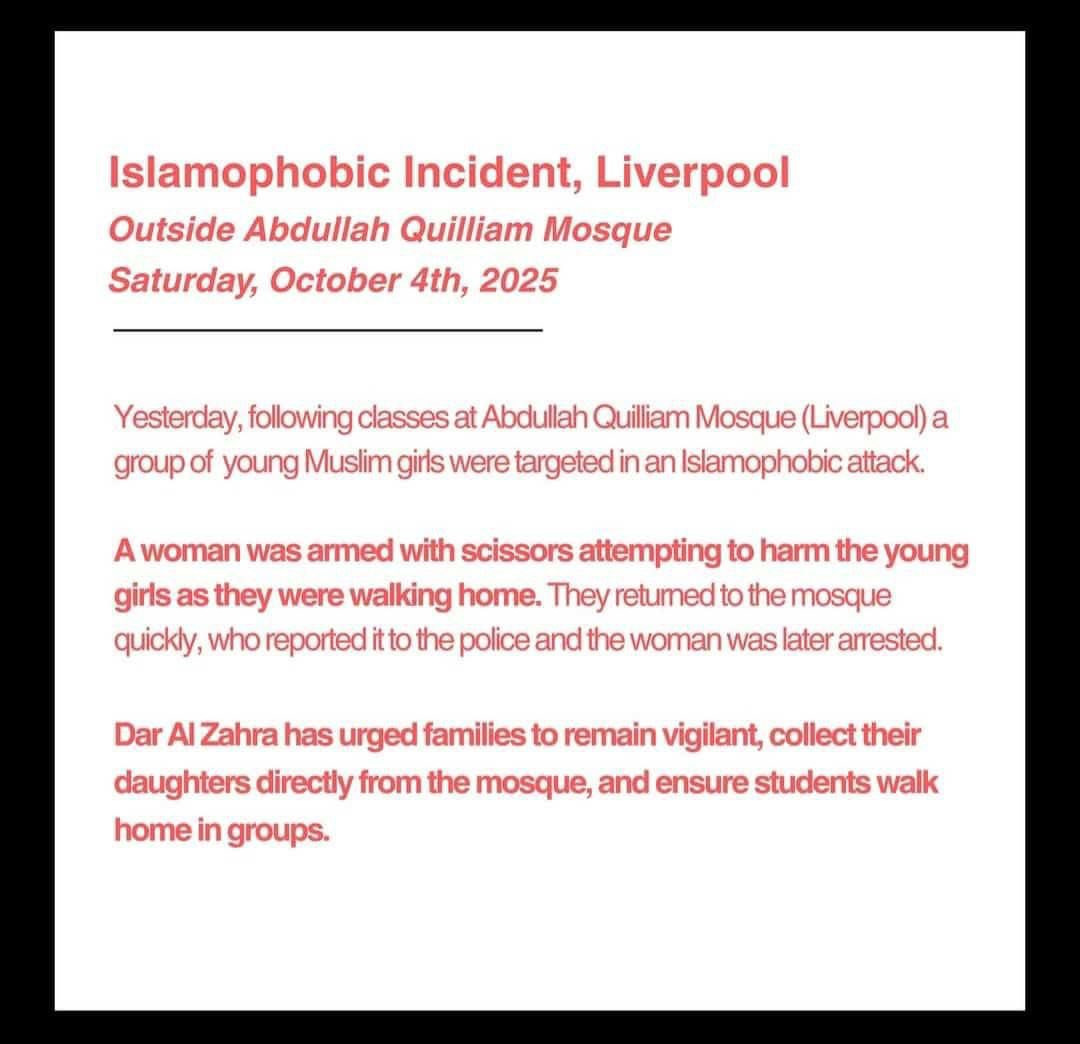
October 14 – Liverpool: A woman was detained under the Mental Health Act after chasing three schoolgirls and later attacking a woman leaving the Abdullah Quilliam Mosque. “I started frantically phoning around people to find a way home… I felt so uncomfortable and worried,” said a mother who witnessed the attack.
Record levels of anti-Muslim hate crime
According to the latest Home Office statistics, 45% of all recorded religious hate crimes in England and Wales (excluding London) in the year to March 2025 were directed against Muslims, a 19% increase from the previous year, marking the largest annual rise on record.
| Perceived religion of the victim | 2024/25 | Proportion of religious hate crimes 2024/25 (%) | Religious hate crimes rate per 10,000 population |
|---|---|---|---|
| Buddhist | 28 | 0 | 1 |
| Christian | 502 | 5 | 0 |
| Hindu | 182 | 2 | 2 |
| Jewish | 2,873 | 29 | 106 |
| Muslim | 4,478 | 45 | 12 |
| Sikh | 259 | 3 | 5 |
| Other | 612 | 6 | 18 |
| No religion | 161 | 2 | 0 |
| Unknown | 1,075 | 11 | [u] |
| Total number of targeted religions | 10,170 | ||
| Total number of religious hate crimes (targeted religion provided) | 9,843 | ||
| Number of offences where no information on targeted religion was provided | 222 | ||
| Total number of religious hate crime offences | 10,065 | ||
Source: Police recorded crime, Home Office. Note: “[u]” indicates an unavailable or unitary value as provided in the source.
Hate crimes targeting Jewish people accounted for 29% of offences, down 18% year-on-year. However, the government’s figures exclude the Metropolitan Police — the UK’s largest force — meaning the true number of Islamophobic offences is likely much higher.
The British Muslim Trust (BMT), the newly established national Muslim hate crime monitoring body, said the statistics reflect a deepening crisis of faith in public institutions.
“This must be a wake-up call,” said Akeela Ahmed, the BMT’s Chief Executive. “The Peacehaven firebombing shows how words of hate translate into violence. We welcome the new funding, but this should have been done long before. British Muslims have been warning about rising hatred for years.”
She added that the recent rise followed a “summer of far-right activity and inflammatory rhetoric” after the July 29 Southport murders, which triggered riots when misinformation online falsely claimed the perpetrator was a Muslim asylum seeker.
“Put bluntly, more people are prepared to make nakedly anti-Muslim statements than at any point this century — and those words have consequences we see today,” Ahmed warned.
Local leaders have accused police and politicians of failing to respond adequately to the growing threat. Saqib Khan directly linked the atmosphere of hatred to far-right agitators. “Figures like Tommy Robinson are fuelling these hate crimes. He was behind much of the unrest during previous riots when refugees were almost burned alive in a hotel. Once again, he’s instigating division.” He also expressed concern that the England flag had been “weaponized” by such groups.
The Suffah Institute linked the attacks to “inflammatory public discourse” scapegoating immigrants and minorities. “This has emboldened the far right and racists,” it said.
The Home Secretary acknowledged the growing fear among Muslims, calling the statistics “unacceptable.” “Too many people are living in fear because of who they are, what they believe, or where they come from,” she said. “We will not tolerate British people being targeted simply because of their religion or identity.”
While Muslim leaders welcomed the government’s new funding, many noted the timing — following weeks of criticism and multiple attacks — underscored a troubling pattern of delayed recognition.
“This government acted only after national outrage,” said one community organiser in Sussex. “Muslim lives shouldn’t need a headline to matter.”
Starmer insisted Britain’s values of tolerance and unity remain strong. “It’s important we don’t surrender our flag to those who use it to divide,” he said during his visit. “It undermines the values of the flag.” For communities still reeling from violence, those words offered some comfort — but not reassurance. “We need protection, yes,” said Saqib Khan, “but we also need justice. Until these attacks are treated as what they are — terrorism — the fear won’t end.”